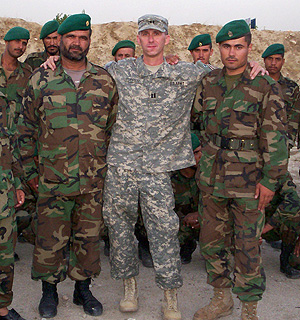Uncensored
June 21, 2010
As an embedded trainer with the Afghan National Army, Benjamin Tupper became an NPR correspondent and now the author of a forthcoming book.
In many respects Greetings from Afghanistan: Send More Ammo, a collection of dispatches from the war against the Taliban, is a book that should never have been written. Just ask the author, Benjamin Tupper ’91 B.A. (P.Sc.)/’92 M.P.A., who acknowledges he broke all the military’s rules on media access in 2006 when he began blogging as an embedded trainer with the Afghan National Army. Tupper’s on-the-ground reporting soon reached a huge audience when he e-mailed NPR and wound up recording numerous commentaries for Morning Edition — all while on active duty with the National Guard.
“It was uncensored, in the sense that it wasn’t just about the pretty things that were happening,” Tupper says of his posts from Afghanistan, which recount life and death in battle as well as the yawning culture gap between Americans and Afghans. “I was lucky I never got in trouble. But [the NPR work] was, overall, supportive of the big picture.”

Tupper was an unlikely soldier in the first place. In high school in Syracuse he was a straight-edge punk rocker with a nose ring, “doing direct action and spray-painting fur stores — all the things a crazy 18-year-old who’s into anarchism would do.” As an undergraduate and then M.P.A. student at SU, Tupper was heavily active in progressive politics, particularly the Sandinista movement. It was in Nicaragua, where he volunteered at a coffee cooperative in a war zone, that Tupper “became addicted to the adrenaline rush and camaraderie of people in combat.” He sought out that that kind of intensity stateside by joining the National Guard, initially as a medic. When he visited Afghanistan in 2004 as a civilian with the group Afghans for Tomorrow, Tupper instantly felt a “fire in the gut” from what he learned about repression under the Taliban. Tupper switched to the infantry and volunteered for the high-risk mission of being embedded, with one other American, in a company of Afghan soldiers.
Within two months of his arrival in Ghazni, Tupper was literally shell-shocked and had dropped 30 pounds. “The stress, the heat . . . the world was falling apart — especially up here in my head,” he says. Writing became the emotional outlet that kept him sane — both in Afghanistan and after he returned home. The power of his book (forthcoming in June from Penguin) is its unflinching honesty about his fears and even mistakes, such as when he nearly ordered an attack on hundreds of supposed Taliban fighters who turned out to be civilians. “If I had to rewrite it now,” says Tupper, “I would strip out so much of my emotion, because I showed a lot of vulnerability. I’d make myself look a lot better.”
Tupper, still in the National Guard, now manages rental properties in Syracuse. Newly remarried, he counts himself lucky to have settled into a productive new life despite the effects of post-traumatic stress disorder. Some of his book’s most painful episodes recount how his fellow soldiers, having survived bombs and bullets in Afghanistan, are self-destructing at home. “All these guys are having this blizzard of problems,” he says. “I came home and went right into counseling, and I wrote about it and put all my anger and energy into defining and editing it. I think it saved me from a lot of bad stuff that I would have done.”
By Jeffrey Pepper Rodgers